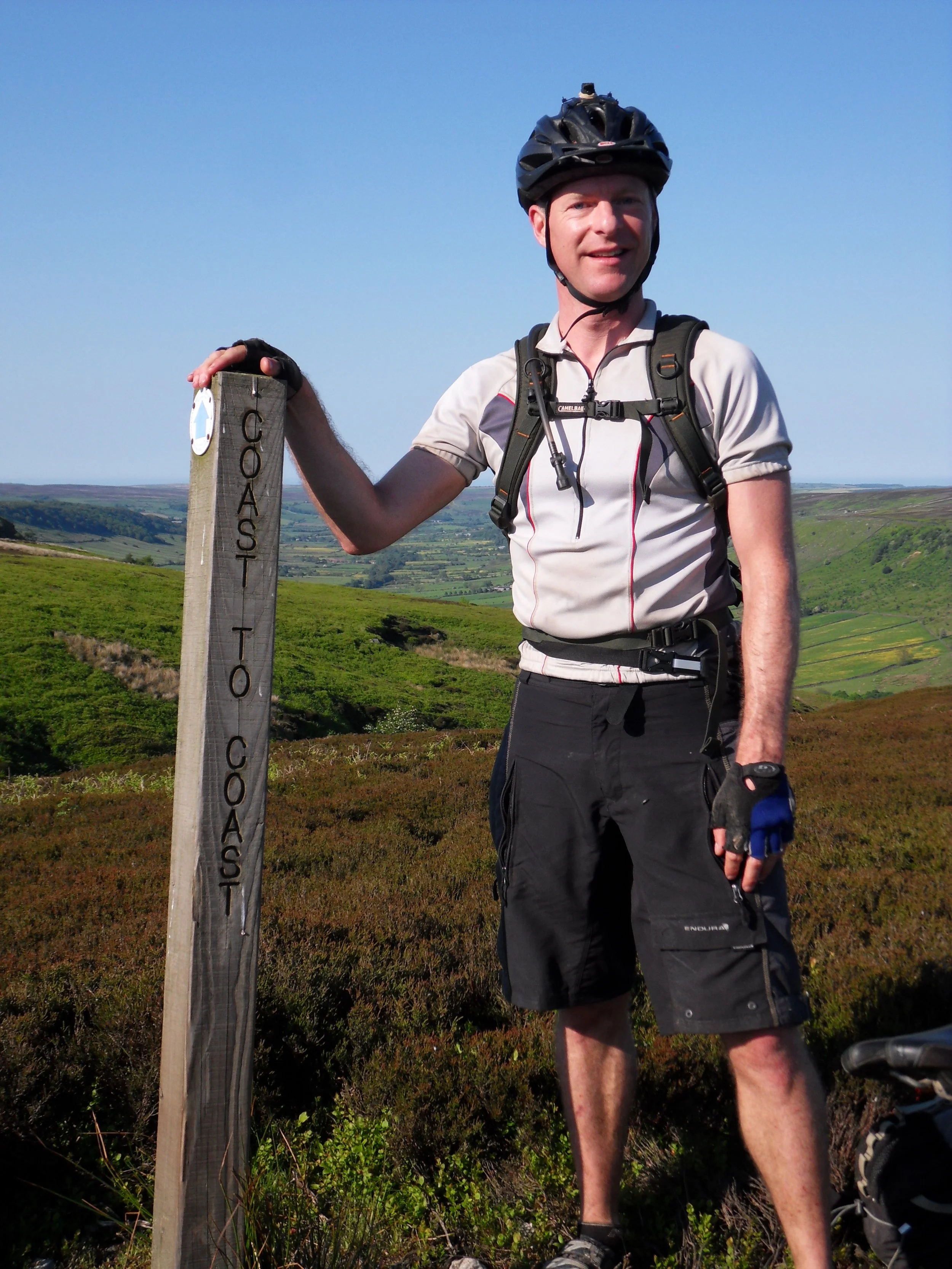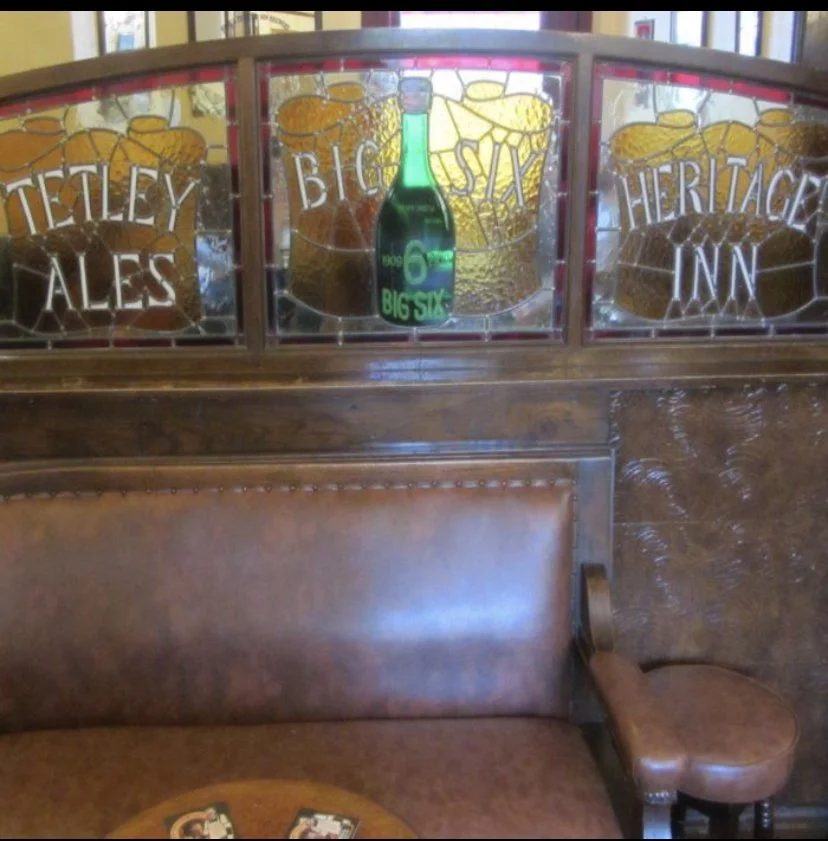The Calder Divide Trail grew out of a promise I made to a friend to ‘do a big ride’ and finding a map of the British Isles created by Robert Szucs.
The Calder Divide Trail is a tribute to the memory of local rider Will Norman who was part of a mountain bike group called ‘Bike Club’.
Will (1979-2021)
Tragically, Will died in 2021 from cancer. We lost a riding buddy. His partner Liz lost a friend and a husband. Their two children lost a father.
Will’s last few weeks were in the care of Overgate Hospice. This was during the Covid lockdown and the staff at the hospice provided comfort and support to Will and Liz and their family. Will’s funeral was online.
The Calder Divide Trail event has been set up with two aims. Firstly to celebrate the beauty of the trails we have here in West Yorkshire. Secondly to raise enough money to fund one day in the life of Overgate Hospice.
The daily running costs of the hospice with its dedicated team of nurses, doctors and therapists is in the order of £2,000 a day. The target is therefore to raise £2,000 and so make a ‘Will Norman day’.
Will joined Bike Club after his partner Liz approached me in the Big 6, a pub in my home town of Halifax, and asked if other riders could join the group. Liz was with her fell running group whilst Will was stuck at work so we compared trails and I took Will’s name and email. Later that week I got in touch with Will and we chatted about biking and our need to explore the outdoors.
Bike Club, 2019
The next week Will joined our Wednesday night ride and then he became a regular, riding through the summer months and into winter just as we’d done for the last 20 years. Will’s job as a teacher took up a lot of his time but he also managed to get out on Saturday rides and joined the Bike Club awards night out.
Will was a quiet, gentle bloke. 6 foot 2 and strong on his bike. He rode with Bike Club for 5 years but then suddenly he stopped coming.
I assumed his school work was consuming all his time but then I ran into Liz in the local park and she told me that Will had pancreatic cancer.
When I met up with Will for the last time he was with Liz and their two young children in the Piece Hall in Halifax. It was between the various lock downs and everyone was out. On that day I was in a record/coffee shop called Loafers and Will was sat outside with a coffee enjoying the sun. We got talking. Liz looked at Will and said “You need to tell him”.
I knew what was coming next. Will laughed but Liz pressed on. “He doesn’t have much longer” she said. There wasn’t much we could say. So we just sat beneath the old sandstone columns and watched the children run around.
Eventually I got up, shook his hands and said “Bike Club has been asking after you and we’ve kept your spot in the Big 6”.
He smiled at hearing the news. I parted with a nod and the words “We’ll do a ride for you”. I didn’t see him again. His death at the age of 42 was a real blow to all of us.
The promise of ‘doing a ride’ stuck in my mind and by chance a few days later I saw a new map of the British Isles created by Robert Szucs. On this map of the British Isles (shown below) every river basin is represented by a different colour and within each basin the thickness of the lines represent the volume of water. Szucs map opened my eyes to a trail that I hadn’t seen before.
For many years I had explored parts of the watershed of the Calder. Szucs’ digital map helped me see the whole watershed of the River Calder that extends from the moors above Todmorden on the Lancashire/Yorkshire border down to Castleford where the River Calder meets the River Aire. Along the way the Calder is joined by six other rivers – the Cragg, Hebble, Ryburn, Colne, Holme and Spen – and covers just under 400 square miles.
So I set out to explore the network of bridleways, green lanes and singletrack that were there, on strips of common land, created by local people over the last 4,000 years, from the Pennine moors such as Flower Scar where the river gathers, on through steep sided wooded valleys such as Coxley, past the high ground of Thieveley Pike and under the white blades of numerous wind farms. I found that the trails connected into a circular route that traced the watershed of the River Calder. I called it the Calder Divide Trail.
Six months after Will had passed Liz got a real surprise when I turned up at her house with the Calder Divide idea. It threw her at first. She was busy raising two children. She had a full time job. But she was a fell runner and loved the hills just like Will did and inside 5 minutes we were recalling stories of Will and his bike adventures. She gave her blessing to the ‘big ride’ and the event and so I got on with the planning.
The photo above shows Will (on the left), enjoying a Bike Club ride in the hills above Hebden Bridge. Will is the rider with the big smile. He always had that smile. He always had time for a chat. He always looked forward to the next ‘big ride’ out on the moors. He would have been on the start line of the Calder Divide Trail.
In the moment I saw the outline of the Calder Divide Trail I also knew there was the outline of a much longer ride along the Yorkshire Divide that would encompass the wider Humber basin into which the 25 main rivers that have shaped Yorkshire flow.
I have now mapped out the Headwaters Trail, a 350km circular route around the high ground of the River Calder, River Aire and River Calder. There is also the 720km Source to Sea Trail which connects trails on the high ground where 10 rivers rise. Rivers such as the Swale, Ure, Nidd and Esk.
I think this way of keeping a promise and seeing the rivers and the landscape they shape is worthy of the words ‘divide’ and ‘trail’. I hope you do to.
Adrian Wright
January 25th 2022
Adrian Wright, coast to coast, 2006







